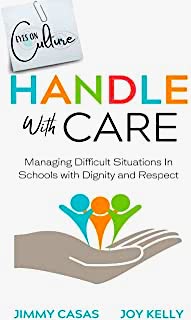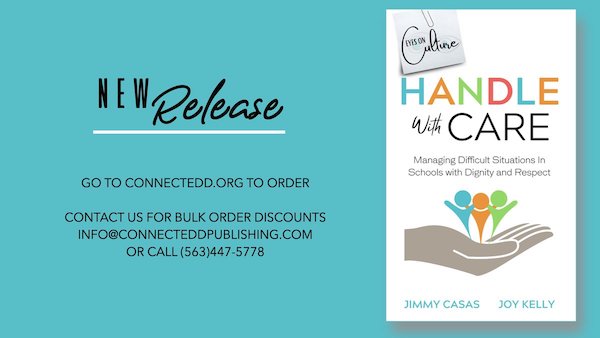 Stoney M. Beavers, Ph.D.
Stoney M. Beavers, Ph.D.
Assistant Director
Alabama Best Practices Center
In 2017, noted school leader Jimmy Casas published Culturize: Every Student. Every Day. Whatever It Takes. For me, reading this book really opened a door to what I felt was missing in many classrooms, school buildings, and entire districts.
As a district-level administrator at the time, I was increasingly aware of the deep issues that we were facing with student and employee discipline. It just seemed to be a daily battle to address all of the issues facing students, families, and employees, and the job was beyond overwhelming as we tried to rapidly adjust policy and procedures to address these challenging situations.
I often walked away from these discipline encounters feeling like we could have avoided them altogether or that at the very least we should have been able to help the individuals and families involved maintain more dignity and respect in the process.
Strategies for building supportive school cultures
 It is for this exact reason that I feel that I connected so deeply with Casas’ new book Handle with Care: Managing Difficult Situations in Schools with Dignity and Respect, co-authored with veteran high school principal Joy Kelly. It was such an honor to read the text in an earlier draft form and to be able to offer an endorsement and advance praise for it.
It is for this exact reason that I feel that I connected so deeply with Casas’ new book Handle with Care: Managing Difficult Situations in Schools with Dignity and Respect, co-authored with veteran high school principal Joy Kelly. It was such an honor to read the text in an earlier draft form and to be able to offer an endorsement and advance praise for it.
While the previous book spoke to me on a level of understanding and connection, this new book offered hope for navigating these situations better and ultimately avoiding them altogether by building stronger relationships with students, families, and employees.
Handle with Care offers today’s educators a unique set of strategies for building strong cultures in schools that help everyone work more effectively to accomplish the challenging task of educating our children and preparing them for the brightest futures possible.
We struggle in schools to teach standards, prepare students for college and career readiness, maintain discipline, and hopefully teach and/or reinforce character. However, as Russell J. Quaglia reminds us in Student Voice, “As currently run, schools are blind to the full beauty of the students” (83).
Quaglia goes on to say that “Schools should focus a lot less on scaffolding, structuring, and assessing the learning, and a great deal more on discovering the unique beauty within each and every student.” The same can be said for the adults in the building. This is what Casas and Kelly remind us to do in Handle with Care.
A book filled with emotionally powerful stories
In this second book of the Eyes on Culture series, Casas and Kelly expand greatly on the concepts from Culturize and really focus on exactly how we do this work. They revisit each of the core principles: Champion for Students, Expect Excellence, Carry the Banner, and Be a Merchant of Hope. In addition, they look at how we can put strategies into practice that help us culturize discipline, extracurricular activities, and school pride with empathy and grace.
 While the strategies in Handle with Care serve to give us hope for bringing a mindfulness to how we deal with these aspects of schooling, what really resonated the most with me were the heartfelt scenarios throughout the book. I could see the faces of students, parents, and employees from these stories. I could think of situations that I had dealt with from behind the desk, and I could also think of times when either I or my child could have been in these exact same situations given one or two different decisions.
While the strategies in Handle with Care serve to give us hope for bringing a mindfulness to how we deal with these aspects of schooling, what really resonated the most with me were the heartfelt scenarios throughout the book. I could see the faces of students, parents, and employees from these stories. I could think of situations that I had dealt with from behind the desk, and I could also think of times when either I or my child could have been in these exact same situations given one or two different decisions.
As educators, we often come into the lives of our students and families during crises. We must honor this position and reflect on how we can do everything possible to help the student, parent, or employee maintain the maximum amount of dignity and respect as we walk through these moments together.
During my times as an administrator, I often ended discipline meetings with Casas’s two crucial questions: Do you believe that we care about you? And: Do you think that we have treated you fairly? While not all students and family members answered affirmatively in every case, I do feel that simply asking these questions with sincerity opened the door for a reparative relationship and expressed a genuine concern and appreciation for the individual and the situation.
I cannot recommend this book highly enough. More than anything, it reminds us of the difficult situations that we all deal with when educating our children. It speaks to our current reality of trying to do all of this during a time of amazing challenge. I must admit that many moments in the book touched me deeply and made me reflect on times when I could have handled situations differently – and better. I hope that you will consider giving it a read. My original endorsement written for the book is below. and I believe that you will find Handle with Care as thought-provoking and uplifting as I did.
Handle with Care: Managing Difficult Situations in Schools with Dignity and Respect
By Jimmy Casas and Joy Kelly
ConnectEDD Publications
(March 2021)
Authors Jimmy Casas and Joy Kelly do not shy away from our most challenging situations in their new book Handle with Care: Managing Difficult Situations in Schools with Dignity and Respect. As an educator and district administrator for the past 30 years, I related deeply to each scenario presented in the book and saw the faces of students and adults who had found themselves in similar situations. While Culturize made us aware of the core principles for making schools better places for students and adults, Handle with Care provides us with clearly- defined tools to implement these principles.
The book’s “Eyes on Culture in Action” sections offer sound strategies for building better school cultures in almost every area. The authors address the varied aspects of school culture including academics, athletics, drama, social and emotional learning, English language learners, special education, student voice, social justice, equity, and student/teacher relationships. The scenarios and strategies found in the book are firmly grounded in the reality of today’s educators and students.
As educators, we are facing the challenges of providing a quality education and positive school culture during a pandemic, in a time of social unrest and divisive political upheaval. Casas and Kelly face these situations head-on and embrace them as opportunities to build better relationships with students, teachers, and families. Through these relationships, we can provide stronger school cultures that promote equitable opportunities in and out of school for the success of both students and adults.
If taken to heart, reflected on, and most importantly acted on, the tools in Handle with Care will make us better. They will make our schools better, and they could make our society better. If you have been looking for an educational book that demonstrates a full understanding of the challenges facing educators today while also providing strategies for dealing with these challenges, then look no further than Handle with Care. The scenarios will speak to you, and you will see yourself, your colleagues, and your students in these stories. You will also see hope for making these situations better in the future.
Through implementing the strategies presented here, educators can work with all stakeholders to move beyond compliance and truly bring joy back into our learning spaces for the students and for the adults. If you can only make time to read one educational book during this hectic year, it must be Handle with Care, but don’t just read it. Re-read it. Implement strategies from it. Live it, and use it to make your classroom, school, or district a joyous place filled with care, dignity, and respect for all.
Resources:
Dr. Stoney M. Beavers is Assistant Director of the Alabama Best Practices Center. He has been an award-winning teacher, a Director of Secondary Curriculum, and was Assistant Superintendent in Blount County (AL) for more than a decade.


0 Comments on "Jimmy Casas: How We Can Build Respectful and Supportive School Cultures"